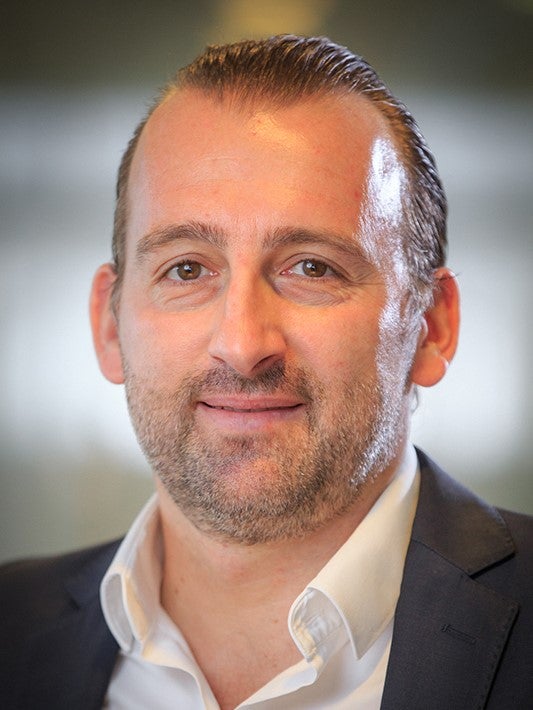This month I sat down with Dr. Andreas Schöpperle, group general counsel for multinational management and technology consulting firm BearingPoint, to discuss positive practices in legal team management.
Please explain your role and your team
As group general counsel, I look after a team of 20 lawyers across Europe. My direct reports are responsible for six different areas.
- Three geographical areas:
- France, Benelux, Africa;
- United Kingdom, Ireland, Nordics, overseas countries; and
- Germany, Switzerland, Austria.
- Three different technical areas of expertise:
- IP and technology;
- Mergers and acquisitions; and
- Legal operations and company secretariat.
Do you have any positive habits or practices?
I consciously block out time into my diary to do things outside of work. Last summer I started yoga, and I make time when I buy my coffee to have a chat with my favorite barista.
Whatever it is, it is important to build time into your week to do something — whether it is exercising, catching up with a friend or meditating. I also encourage the team to be agile with their time. Whether they have to work late, they find they have some quiet time, or they feel overwhelmed with the workload, I encourage them to take a few hours off and do something else to recharge and return energized and often with better ideas and concentration and ideas. Of course, urgencies and priorities need to be well managed. Trust and transparency are therefore key elements in my leadership style.

Do you use any positive practices in your leadership?
Continuing to grow and develop your team is the GC’s responsibility to avoid people becoming siloed in their areas, underdeveloped, and dissatisfied. This is harmful to them as individuals as well as the business because in-house lawyers need to see the big picture and solve problems for the whole business, not just what is in front of them.
I also encourage the team to seek out opportunities for themselves to broaden their skills and experience and regularly share my own experiences — including my cultural experiences when I traveled the different continents or worked in Singapore and the various leadership articles I read to further develop myself.
"Continuing to grow and develop your team is the GC’s responsibility to avoid people becoming siloed in their areas, underdeveloped, and dissatisfied."
- Dr. Andreas Schöpperle
Where I can, I share the broader business and strategic priorities to help them to understand how their work contributes to the organization. I encourage team initiatives where two to five people take on a project with the business, hopefully giving them a sense of broader connection and community with others outside of the legal team. I truly believe that it is crucial for an in-house lawyer to connect with other departments, to understand how they function and understand the interconnections between the different service departments.
We recently started working on a team purpose, which I hope will create inclusion and resonate with the team and be the reason they get up in the morning or stay back to work at night.
I think it is important for legal departments and the individual in-house lawyer to step back on a regular basis and to reflect on the broader impact of their work. Fighting the right battles, taking calculated risk and decisions, having frank and transparent discussions with stakeholders are key for me to become a trusted adviser to the business.
What qualities do you try to foster in your team?
I strongly encourage the team to speak up, to be proactive, and agile. I try to transpose a culture where making mistakes is part of the journey — this is a very challenging aspiration for legal professionals as the impact could be big; but I truly believe it is only by feeling comfortable making mistakes that people will be proactive, further develop, and partner with the business, helping make decisions and take on risk rather than being reactive and risk averse.
I also work with the team on structured goal setting. Everyone sets six annual goals where they need to volunteer and contribute to the business (e.g., trainings, process optimization, getting a seat at the table), two team goals, and two personal development goals. I try to foster a culture where people are curious about the business and their stakeholders and self-manage their own personal and professional development.
What are your tips for anyone feeling overwhelmed, stressed, or burned out?
Being proactive and scheduling time to do something outside of work will help people to rest and recharge and build reserves to better manage stress and burnout.
The past few years have been challenging and, as a leader, it is important to recognize that different people cope or react differently. If there is someone who is burning out, it is important to discuss it with them openly and sensitively and work on a solution, which may include the person taking time off work as the best outcome for them and the organization.
I also regularly take time to discuss what people are working on and help to reprioritize their work to ensure the team is predominantly spending their time on work that adds value to the business and is interesting and challenging for them and also plays to their strengths. I look at outsourcing or finding a technical solution for work that is more routine and doesn’t add value. Continuously developing and working on different and interesting (and challenging) projects rather than repetitive and reactive work is in my view good for an individual’s mental health as well as organizational health.
"The past few years have been challenging and, as a leader, it is important to recognize that different people cope or react differently."
- Dr. Andreas Schöpperle
It is also important to help people find meaning in their daily work by discussing with them whether they aspire to focus on legal management and innovation or prefer to remain more technically focused. While those who focus on management and innovation have probably more natural variety in their work, you need as a GC to help someone who wants to remain technically focused maintain the daily excitement in their work by balance continually challenging, diverse, and routine work.
While traveling is difficult now, I look for opportunities for the team that combine business needs, personal motivation, and reward and opportunities to contribute to individual and our sustainability aspirations at BearingPoint. For example, combining personal travel with business travel.
What are some books, talks, or podcasts you recommend?
I enjoyed Adam Grant’s recent TED talk on “How to Stop Languishing and Start Finding Flow” and Erin Meyer’s book The Culture Map, which we bought for everyone in the team and discussed in a team meeting.
Leadership takeaways from Dr. Schöepperle
Our discussion highlighted some positive takeaways for leaders:
- Proactively manage your diary and block out time to rest and recharge.
- There are benefits to different types of rest and activities, including meditation to refocus a tired mind. Don’t forget nature can help you to restore your attention.
- Make time for social connection.
- Have coffee with a friend, go on walks for your team meetings and regularly talk to your barista (and don’t forget to thank them as gratitude is an important positive emotion).
- Introduce positive goal setting to your team.
- Spend time with your team and help your team find purpose and meaning in their work so they feel more connected to the business.
- Foster a culture where people can make mistakes as this helps develop a growth mindset.
- Discuss what helps people achieve flow and find practical ways to achieve Grant’s comment that the strongest factor in daily motivation and joy is a sense of progress (even a small one).
- Consider how you can help your team develop and find challenging and enjoyable work, which will also help build resilience and prevent burnout.
- Use your team meetings to include positive practices.




